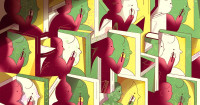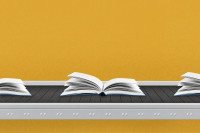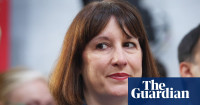
Big Publishing Killed the Author
newrepublic.com – Wednesday November 15, 2023

The suggestion that Beloved, Toni Morrison’s acclaimed novel about slavery and its afterlives, is also a parable about the publishing industry would be bizarre, even offensive—if, that is, Morrison herself hadn’t explicitly suggested it. For years, Morrison had felt not merely penned in by her career as an editor at the publishing giant Random House; she had felt indentured, “held in contempt—to be played with when our masters are pleased, to be dismissed when they are not,” as she declared in a speech six years before publishing Beloved. Upon leaving her job at Random House to focus on writing full-time, she felt “free in a way I had never been, ever.… Enter Beloved.” It was, she continued in the novel’s preface, “the shock of liberation”—liberation from the world of corporate publishing—“that drew my thoughts to what ‘free’ could mean.” In the novel itself, Morrison has Baby Suggs, the protagonist’s mother, describe freedom from slavery in strikingly similar terms.

How To Write A Query Letter That Makes Literary Agents Take Notice
livinggossip.com – Tuesday November 14, 2023

Writing a query letter is a crucial step in the journey of getting your manuscript published. Literary agents receive countless submissions daily, and your query letter is your first chance to make a lasting impression. To ensure that your work gets the attention it deserves, you need to craft a compelling query letter that stands out from the rest. In this guide, we will provide you with a step-by-step process on how to write a query letter that literary agents will find irresistible. Let’s get started!

Faber chair Page says he is 'confident' publishers will adapt to AI
thebookseller.com – Tuesday November 14, 2023

Stephen Page, Faber and Faber chair, has said that he is "confident" publishers will find their way with AI, adding that "technology usually amplifies publishing".
In a public lecture delivered at the University of West London on Thursday 9th November, Page reflected on the "five revolutions" that publishing has undergone over recent decades and how the book trade can rise to future challenges instead of being "swept up" in them. He said that human, intellectual, social and financial capital are "at the heart of what has made publishing endure" and will be essential in future challenges like AI.
"Publishing is innately revolutionary in its makeup," Page said. "It takes the ideas that will change society [and] makes them public through putting them into the world."

What's the Future of Books?
esquire.com – Thursday November 9, 2023

The publishing industry is in flux. One major publisher has been acquired by a private equity firm, editors are departing (and getting laid off) from others, there are fewer book media outlets than ever, and most literary discourse is happening online. But what does it all mean for the books themselves, and the ways that readers are discovering them? Here, we make some predictions about the future of books.
“Celebrities and tastemakers are becoming the new medium for discovery,” says Ariele Fredman, a literary agent at United Talent Agency who previously launched eight #1 New York Times bestsellers as a publicist. As a result, it will be more important than ever for debut novels to land on book club rosters.
A Reese Witherspoon, Oprah, or Jenna Bush endorsement can be enough to not only secure a spot on the bestseller list, but anoint an author with a fanbase that lasts. “If you don't get one of those coveted spots, it becomes even harder to break a new voice,” Fredman adds.
Outside of those chosen debuts, “we're going to see a continued investment in bigger-name authors” from publishers, says former editor Molly McGhee, the author of Jonathan Abernathy You Are Kind, “because they have guaranteed returns on investment.”

Days of The Jackal: how Andrew Wylie turned serious literature into big business
theguardian.com – Thursday November 9, 2023

Andrew Wylie is agent to an extraordinary number of the planet’s biggest authors. His knack for making highbrow writers very rich helped to define a literary era – but is his reign now coming to an end?
Andrew Wylie, the world’s most renowned – and for a long time its most reviled – literary agent, is 76 years old. Over the past four decades, he has reshaped the business of publishing in profound and, some say, insalubrious ways. He has been a champion of highbrow books and unabashed commerce, making many great writers famous and many famous writers rich. In the process, he has helped to define the global literary canon. His critics argue that he has also hastened the demise of the literary culture he claims to defend. Wylie is largely untroubled by such criticisms. What preoccupies him, instead, are the deals to be made in China.
Wylie’s fervour for China began in 2008, when a bidding war broke out among Chinese publishers for the collected works of Jorge Luis Borges. Wylie, who represents the Argentine master’s estate, received a telephone call from a colleague informing him that the price had climbed above $100,000, a hitherto inconceivable sum for a foreign literary work in China. Not content to just sit back and watch the price tick up, Wylie decided he would try to dictate the value of other foreign works in the Chinese market. “I thought, ‘We need to roll out the tanks,’” Wylie gleefully recounted in his New York offices earlier this year. “We need a Tiananmen Square!”

Has It Ever Been Harder to Make a Living As An Author?
esquire.com – Wednesday November 8, 2023

In early August, after Andrew Lipstein published The Vegan, his sophomore novel, a handful of loved ones asked if he planned to quit his day job in product design at a large financial technology company. Despite having published two books with the prestigious literary imprint Farrar, Straus, and Giroux, Lipstein didn’t have any plans to quit; he considers product design to be his “career,” and he wouldn’t be able to support his growing family exclusively on the income from writing novels. “I feel disappointed having to tell people that because it sort of seems like a mark of success,” he said. “If I’m not just supporting myself by writing, to those who don't know the reality of it, it seems like it's a failure in some way.”
The myth of The Writer looms large in our cultural consciousness. When most readers picture an author, they imagine an astigmatic, scholarly type who wakes at the crack of dawn in a monastic, book-filled, shockingly affordable house surrounded by nature. The Writer makes coffee and sits down at their special writing desk for their ritualized morning pages. They break for lunch—or perhaps a morning constitution—during which they have an aha! moment about a troublesome plot point. Such a lifestyle aesthetic is “something we’ve long wanted to believe,” said Paul Bogaards, the veteran book publicist who has worked with the likes of Joan Didion, Donna Tartt, and Robert Caro. “For a very small subset of writers, this has been true. And it’s getting harder and harder to do.”

From Dream to Draft: Transform Your Ideas with Creative Writing Courses
fleepbleep.com – Friday November 3, 2023

Are you an aspiring writer with a head full of stories waiting to be told? Do you have a burning desire to share your thoughts, emotions, and imagination with the world? If so, you’re not alone. Many dream of becoming writers but struggle to turn their ideas into fully-fledged drafts. The good news is that there’s a path from dream to draft, and it often begins with creative writing courses.
In this article, we’ll explore the transformative power of creative writing courses, how they can help you unlock your creativity, hone your skills, and ultimately bring your writing dreams to life. Whether you’re a complete novice or an experienced writer looking to refine your craft, read on to discover how these courses can be your guiding light on the journey from dream to draft.

The Ultimate Guide to Finding a Literary Agent for Your Book
legaldesire.com – Thursday November 2, 2023

If you’re an aspiring author who dreams of publishing your book by a traditional publishing house, securing a literary agent is essential. A literary agent acts as a professional representative, connecting authors with publishers. Their industry connections, expertise, and experience are instrumental in selling your manuscript to the right publisher, negotiating favorable deals, and safeguarding your rights.
However, finding the ideal literary agent who is genuinely interested in your book and can secure the best deal can be daunting. Standing out from many aspiring authors and avoiding scams and pitfalls are common concerns.
In this guide, we will address these questions and provide valuable insights on how to find a literary agent. Whether your book is fiction or nonfiction, Christian or secular, genre-specific or literary, we will offer the best tips and strategies to help you find and attract the perfect agent for your manuscript.

Do we need to save fiction from conglomerate publishing?
washingtonpost.com – Saturday October 28, 2023

Literature is, variously: a refuge from reality, an encounter with an era, an expression of a singular sensibility and a sheer delight. But it is also a business, as Dan Sinykin, an English professor at Emory University, explains in his new monograph, “Big Fiction: How Conglomeration Changed the Publishing Industry and American Literature.”
Many academics are clinical prose stylists, but Sinykin writes with verve and narrative flair as he documents the consolidation of the major publishing houses — and, along the way, overturns the myth of “the romantic author,” that lone genius unfettered by social circumstances or material constraints. Far from working in isolation, he argues, writers inhabit a “hidden world” of “subsidiary rights specialists, art directors, marketing managers, sales staff, wholesalers, chain book buyers, philanthropists, government bureaucrats.” In “Big Fiction,” these shadowy figures, so central yet so uncelebrated, slink out of the wings and onto the stage. The result is a fascinating and informative account of the convulsions roiling the American publishing industry for the past half-century — and a devastating reckoning with the ways in which conglomeration has altered American fiction.
Still, sentimental and naive as I am, I cannot quite shake the conviction that literature is more than an emanation of economic circumstance. For all its fragility and susceptibility to material degradation, it continues to strike me as a member of that endangered and embattled species: art.

How common is plagiarism in the publishing industry?
theguardian.com – Saturday October 28, 2023

Rachel Reeves’s mea culpa over her failure to properly reference some sentences in her new book has thrown the spotlight on the thorny issue of plagiarism and the pitfalls of tedious factchecking.
Publishers and authors agree that if your name is on the book cover, the responsibility to properly reference any borrowed phrases or facts in the bibliography lies squarely with you.
“One thing that is quite curious,” one publishing insider said of the industry, “is that there doesn’t seem to be much formal factchecking. The author warrants to deliver something that is original, not plagiarised. It’s in the contract.” The publisher, they added, “is taking it on trust”.
Get the free newsletter | Submit a news item or article | Get Writers' News for your website





